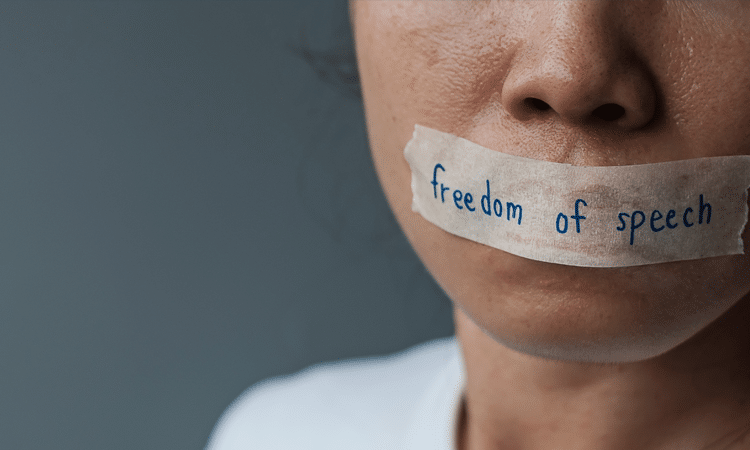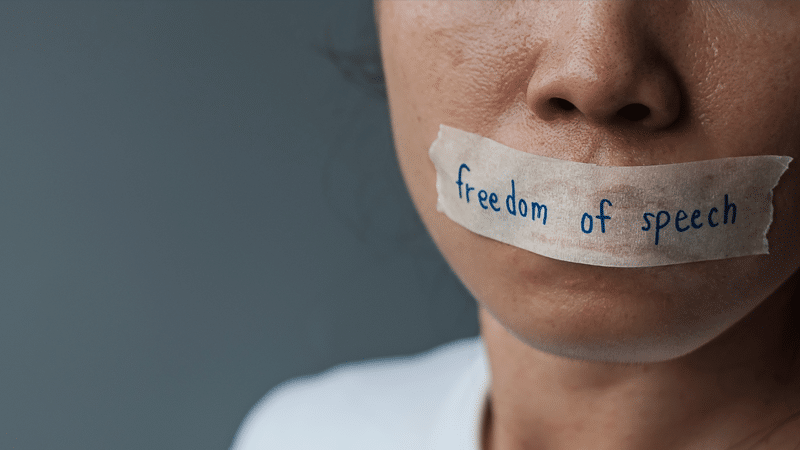No Longer at Ease: Freedom or Fear? The Quiet Decline of Free Speech in Britain

In a nation once heralded as a beacon of free speech and individual rights, the United Kingdom now finds itself teetering on the edge of a troubling future. A future where liberty is slowly being eroded, not by an overt dictatorship, but through a creeping, insidious culture of censorship. From seemingly harmless social media posts to the silencing of personal beliefs, the cases of Sarah Phillimore, Adam Smith-Connor, and Dr. Kelvin Wright reveal the dangerous trajectory the UK is on—one that threatens the very core of free expression.

The Test of a Lawyer’s Satire: Sarah Phillimore’s Warning
Sarah Phillimore, a British lawyer and free speech advocate, sought to test the waters of the UK’s censorship laws with what many would consider a harmless, if somewhat absurd, tweet. She jokingly suggested that her cat might be a “Methodist” because it liked “Dreamies” cat treats. This trivial statement, posted in jest, spiraled into a real-life police investigation after Phillimore asked a friend to report her for “hate speech against Methodists.” What followed was both bewildering and alarming: she was issued a case number, and the incident was officially recorded as a “barrister posting hate.”
For Phillimore, the event was a stark illustration of how the state can overreach, turning innocent commentary into a subject of official scrutiny. “It was recorded as a ‘barrister posting hate,'” she says, emphasizing the absurdity of the situation. It was a moment that highlighted the increasing risks of free expression in a society that seems ever more willing to police words, even when no harm is intended.

A Prayer Interrupted: Adam Smith-Connor’s Experience
The situation escalated further with the case of Adam Smith-Connor, a British army veteran who found himself in the midst of a legal storm simply for praying in a public space. Smith-Connor, who had served in Afghanistan, stood within an abortion clinic buffer zone to silently pray for a son he lost to abortion. As he did, he was approached by a police officer who asked, “What is the nature of your prayer?”
Smith-Connor responded simply, “What is the nature? I’m praying for my son.” Yet, despite this clear and innocent explanation, the encounter escalated into a legal battle that saw him convicted of what many would deem a “thought crime.” This conviction raises critical questions about the extent to which personal beliefs—especially those tied to religion—can be criminalized in a society that once championed freedom of expression.

The Military Disciplinary Process: Dr. Kelvin Wright’s Cautionary Tale
Another chilling example of the growing restrictions on free expression can be found in the case of Dr. Kelvin Wright, a former British army officer whose career was upended after sharing a post in favor of women’s rights. His post offended a transgender British soldier, triggering a disciplinary process within the army. Although Wright was eventually exonerated, the incident had far-reaching consequences, ultimately leading to his early departure from the military. As Wright reflects on the experience, he offers a grim warning: “The frightening moral is, don’t say any opinions.” This chilling sentiment reveals the extent to which self-censorship has become the norm in a society where expressing opinions—especially controversial ones—can have dire professional consequences.
The Rise of “Non-Crime Hate Incidents”
These personal stories are not isolated. In fact, they reflect a disturbing pattern of overreach by British authorities. According to reports, the UK has investigated over 250,000 so-called “non-crime hate incidents” in the past decade, an average of 66 each day. These investigations target individuals for speech or actions that authorities deem offensive, even if no actual crime has been committed. As a result, people are now subject to police scrutiny simply for expressing opinions—whether online or in public—that deviate from the prevailing narratives.
The consequences of being investigated for such an incident can be severe. Having a “non-crime hate incident” recorded can damage one’s reputation, leaving a permanent stain on background checks and hindering future opportunities. As Harry Miller, founder of the organization Fair Cop, notes, “No reasonable person wants to have on a police record that you are guilty of some form of hate.” This fear of being labeled as offensive or hateful is enough to silence many individuals, preventing them from engaging in open, honest dialogue on sensitive topics.

The Impact on Free Speech and National Identity
The rise of these investigations has led critics to question whether Britain can still claim to uphold the principle of free speech. In the absence of a First Amendment, British citizens have long relied on common law to protect their right to express opinions. However, the growing prevalence of “offense archaeology”—where old social media posts are unearthed and scrutinized years after they were made—suggests that this protection is no longer a guarantee.
Toby Young, founder of Britain’s Free Speech Union, reflects on how quickly the situation has worsened. “I liken it to falling through a burning building,” Young says. “Every time you think things can’t get any worse and you’ve finally reached rock bottom, the floor gives way.” His analogy speaks to the sense of despair that many defenders of free speech feel as they watch Britain’s free expression rights continue to shrink. The situation has become so dire that even the most outspoken advocates of liberty fear the consequences of speaking their minds.
A Culture of Silence: The Chilling Effect of State Surveillance
This growing climate of censorship has created what can only be described as a “culture of silence.” Citizens are becoming increasingly hesitant to speak out or share their opinions for fear of being investigated or prosecuted. As former police officer Harry Miller explains, many officers are themselves “sick and tired of this nonsense,” yet they still feel constrained by the growing pressure to suppress certain viewpoints. This dynamic is not only dangerous to free speech but also to the very concept of a free society.
Even more troubling is the fact that some law enforcement officers seem to derive a certain satisfaction from policing public opinion. “I’ve seen far too many police officers who look like they are enjoying what they’re doing,” Miller adds. This troubling development raises questions about the role of the state in regulating thought and expression, and whether there is a growing appetite within law enforcement to wield power over individuals’ personal beliefs.
A Stark Parallel to Orwell’s 1984
For many observers, the developments in the UK are reminiscent of George Orwell’s dystopian novel 1984, in which a totalitarian regime stifles free thought and expression. Orwell’s vision of a society in which the government controls what people can say, think, and believe now seems all too real. As Harry Miller puts it, “It’s pure Orwell. This is straight out of 1984.” The eerie similarities between the world Orwell depicted and the UK’s current trajectory are too striking to ignore.
The Path Forward: Can Free Speech Be Restored?
Despite the grim outlook, some remain hopeful that Britain can return to its roots as a champion of free speech. Toby Young, though deeply concerned, insists that it’s not too late to reverse the tide. “If we abandon our belief, our commitment to free speech, it will be not just catastrophic for us, but catastrophic for the rest of the world,” he warns. Young’s call to action serves as a reminder that the fight for free speech is not just a national issue but a global one, with implications that reach far beyond the shores of Britain.
As the UK reaches this critical tipping point, the question remains: How far will the nation descend before the public demands a return to the fundamental principles of liberty? The answer to this question will shape not only the future of free speech in Britain but also the future of freedom itself in the modern world. The clock is ticking, and it is up to every citizen to defend the values that once defined this great nation.




